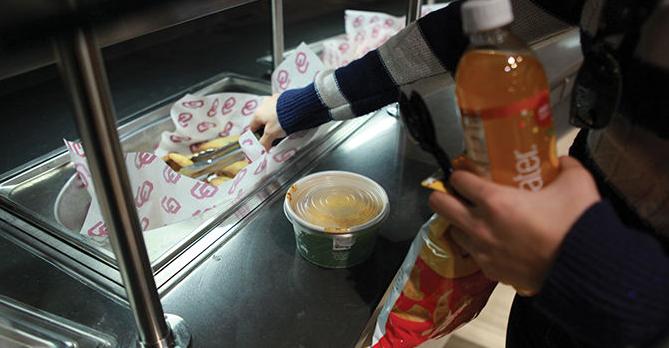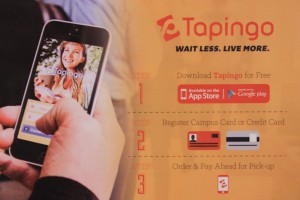
Tapingo 200

Tapingo 200 Rating: 5,0/5 6914 votes
Get directions, reviews and information for Tapingo Inc in Denver, CO.
A mobile application, also referred to as a mobile app or simply an app, is a computer program or software application designed to run on a mobile device such as a phone, tablet, or watch. Apps were originally intended for productivity assistance such as email, calendar, and contact databases, but the public demand for apps caused rapid expansion into other areas such as mobile games, factory automation, GPS and location-based services, order-tracking, and ticket purchases, so that there are now millions of apps available. Apps are generally downloaded from application distribution platforms which are operated by the owner of the mobile operating system, such as the App Store (iOS) or Google Play Store. Some apps are free, and others have a price, with the profit being split between the application's creator and the distribution platform.
Mobile applications often stand in contrast to desktop applications which are designed to run on desktop computers, and web applications which run in mobile web browsers rather than directly on the mobile device. Delivery is the process of transporting goods from a source location to a predefined destination. There are different delivery types.
Cargo are primarily delivered via roads and railroads on land, shipping lanes on the sea and airline networks in the air. Certain specialized goods may be delivered via other networks, such as pipelines for liquid goods, power grids for electrical power and computer networks such as the Internet or broadcast networks for electronic information.The company was bought by Grubhub in Fall 2018.Tapingo is differentiated from other on-demand delivery/logistics companies, such as, or, by focusing its efforts on serving the college market. Through Tapingo, users can browse menus, place orders, pay for the meal and schedule the pickup or have it delivered. On certain campuses, students are able to use their university's meal dollars to pay for food. DoorDash Inc.
Is a San Francisco–based on-demand food delivery service founded in 2013 by Stanford students Andy Fang, Stanley Tang, Tony Xu and Evan Moore. A Y Combinator–backed company, DoorDash is one of several technology companies that uses logistics services to offer food delivery from restaurants on-demand. DoorDash launched in Palo Alto and has since expanded to 56 markets and more than 600 cities across North America.In spring of 2012, Tapingo first launched its services on five campuses (, and ), and has since expanded to more than 200 college campuses across the U.S. And Canada, serving 100 markets. To date, Tapingo has received $36M in venture funding.
From, Kinzon Capital, DCM Ventures. Santa Clara University is a private Jesuit university in Santa Clara, California. It has 5,499 full-time undergraduate students and 3,130 graduate students.
Founded in 1851, Santa Clara University is the oldest operating institution of higher learning in California and the west coast of the United States and has remained in its original location for 168 years. The university's campus surrounds the historic Mission Santa Clara de Asis which traces its founding to 1776. The campus mirrors the Mission's architectural style and provides a fine early example of Mission Revival architecture. The university is classified as a 'Doctoral/Professional' university by Carnegie Classification. Online food ordering is the process of ordering food through the restaurant's own website or mobile app, or through a multi-restaurant's website or app.
A customer can choose to have the food delivered or for pick-up. The process consists of a customer choosing the restaurant of their choice, scanning the menu items, choosing an item, and finally choosing for pick-up or delivery. Payment is then administered by paying with a credit card or debit card through the app or website or in cash at the restaurant when going to pickup. The website and app inform the customer of the food quality, duration of food preparation, and when the food is ready for pick-up or the amount of time it will take for delivery. The Fair Food Program (FFP) is a legally binding agreement between the Florida Tomato Growers and the Coalition of Immokalee Workers (CIW). It aims to provide Florida’s tomato workers with better wages and working conditions. The program has a list of six elements in order to ensure social responsibility and to create a strong partnership between workers, growers and buyers.
The Fair Foods Standards Council (FFSC) oversees the program and ensures that standards are upheld. Big companies, including Taco Bell and Walmart have pledged to pay a penny more per pound of tomatoes and buy only from growers who comply with the program. Retail food delivery is a courier service in which a restaurant, store, or independent food delivery company delivers food to a customer. An order is typically made either through a restaurant or grocer's website or phone, or through a food ordering company. The delivered items can include entrees, sides, drinks, desserts, or grocery items and are typically delivered in boxes or bags. The delivery person will normally drive a car, but in bigger cities where homes and restaurants are closer together, they may use bikes or motorized scooters. Retrieved August 25, 2015.
Nation’s Restaurant News. Retrieved September 8, 2015. Retrieved September 9, 2015. Ramper, Johnny.
Retrieved 4 April 2017. Yahoo Finance.
Godus Wars mixes tactical Real Time Strategy gameplay with the mechanics of the God game genre. It’s fun, it’s simple and it’s brutal. Take control of one of four Deities, each with different play styles, abilities and powers. Use your might to battle over 7 varied continents, through hundreds uniquely designed and modifiable levels.  The release of Godus Wars demonstrates that we are still dedicated to Godus. Everyone who owns or has previously purchased Godus, already has Godus Wars! Godus Wars is free for all previous Godus Kickstarter backers & owners - It should auto-magically appear in your steam library, if it doesn't please let us know!”.
The release of Godus Wars demonstrates that we are still dedicated to Godus. Everyone who owns or has previously purchased Godus, already has Godus Wars! Godus Wars is free for all previous Godus Kickstarter backers & owners - It should auto-magically appear in your steam library, if it doesn't please let us know!”.
Retrieved October 5, 2015. Carmel Ventures. Vator News. DCM Ventures. Qualcomm Ventures. Archived from on 2015-09-19. Cite uses deprecated parameter deadurl=.
Bloomberg Business. Retrieved April 2, 2015. Venture Beat. Retrieved February 5, 2014. Retrieved September 1, 2015. Retrieved September 1, 2015. Business Insider.
Retrieved September 1, 2015. Yahoo Finance.
Archived from on 2015-12-07. Retrieved Dec 2, 2015. Cite uses deprecated parameter deadurl=. Dallas Business Journal. Retrieved October 2, 2015.
The Wall Street Journal. Retrieved October 5, 2015. The New York Times. Retrieved October 5, 2015.External links.
Food delivery giant GrubHub (NASDAQ: ) recently announced a deal to acquire leading college campus food-ordering-platform Tapingo. The market reacted positively to the news, sending GRUB stock up a few percentage points. That means that GRUB stock added about $350 million to its market capitalization in response to a $150 million acquisition.Does that really make sense?Absolutely.Though the $150 million price tag ostensibly implies that the deal is nothing to write home about (GrubHub has a $12.5 billion market cap), I believe that the acquisition was actually critical for GrubHub.GrubHub is the leading player in the hyper-growth but easily-commoditized food delivery market. The company needs everything and anything it can get its hand on to differentiate itself from the competition in order to maintain its market-leading position. The acquisition of Tapingo does that by enabling the company to dominate the college food delivery niche.
That domination, in turn, will inevitably allow GrubHub to both expand its market share and increase awareness of its services.Tapingo is probably worth more than $350 million to GRUB. If the acquisition results in even just a few percentage points of market share expansion, that would translate into additional revenue of $600 million or more. Thus, the fact that the market cap of GRUB stock rose by $350 million in response to the Tapingo acquisition makes sense.Over the long-term, GRUB stock will be a winner, as long as the company can defend its market share. That will be tough do. But the Tapingo acquisition is a step in the right direction, and as a result, it is a material positive for GrubHub stock.
The Long-Term Growth Outlook of GRUB Stock Is Positive, But Has RisksGrubHub stock has been one of Wall Street’s favorites over the past few years because the company has emerged as a leader in the food delivery industry. The industry is expected to become massive, much like e-commerce. Moreover, GrubHub has, much like Amazon (NASDAQ: ) had in e-commerce, the advantages of being the first mover and the market leader.From this perspective, many bulls see GrubHub as the Amazon of food delivery. Granted, food delivery is tiny relative to total commerce. Global spending on restaurants is estimated to be between and, while global spending on consumer products is estimated to be around $40 trillion. That means GrubHub’s addressable market is about 6% the size of Amazon’s addressable market.
But the restaurant market is still large enough to propel GRUB stock higher. Amazon’s retail business has an estimated value of.

If GrubHub’s business becomes roughly 6% the size of Amazon’s retail business, then the implied valuation of GrubHub stock is $25 billion. The current valuation of GRUB stock sits at $12.5 billion, so GRUB stock could potentially rally 100%.Thus, if everything goes right and GrubHub morphs into the Amazon of food delivery, GRUB stock could double in the long run.But there is one big risk to that thesis: competition. The food delivery space promises to be huge. But it also could easily become commoditized. How do you differentiate your food delivery services from those of the competition? The same way you differentiate ride-sharing services and e-commerce marketplaces: Price and convenience.For GrubHub to maintain its leadership position, it needs to differentiate itself on price and convenience.
If it doesn’t, then the whole bull thesis will be nullified, and someone else will become the Amazon of food delivery. The Tapingo Acquisition Mitigates the Risks Facing GRUB StockThe Tapingo acquisition makes a ton of sense for GRUB because the deal allows it to become more convenient for college students than the competition.Tapingo dominates a niche of the food delivery market. Specifically, the company provides digital-food-ordering services for 150 college campuses across the United States. Combining that network with GrubHub’s food delivery services will allow GrubHub to enhance the convenience-value proposition of its service for college students.That is important because college students are at the forefront of the at-home economy. Presumably, over the next decade as college students get jobs, they will turn into the driving force of the food delivery economy. If GRUB proves its enhanced convenience to college student, the company could establish some brand loyalty with them. That brand loyalty, in turn, should allow GRUB to increase its market share in the long-run.The food delivery market is expected to be worth alone over the long-term.
Thus, 3% additional share would translate into $2.4 billion in additional gross food sales for GRUB. Assuming a 25% take rate, the extra 3% of market share would translate into $600 million in sales.Long story short, by leveraging the Tapingo acquisition to grow its market share by a few percentage points, GRUB could increase its sales by hundreds of millions of dollars in the long-run. Bottom Line on GRUBGRUB is a long-term winner and headed for $200 and up as long as this company can defend its market share. The Tapingo acquisition is a step in the right direction and consequently is positive for GRUB stock.As of this writing, Luke Lango was long GRUB.